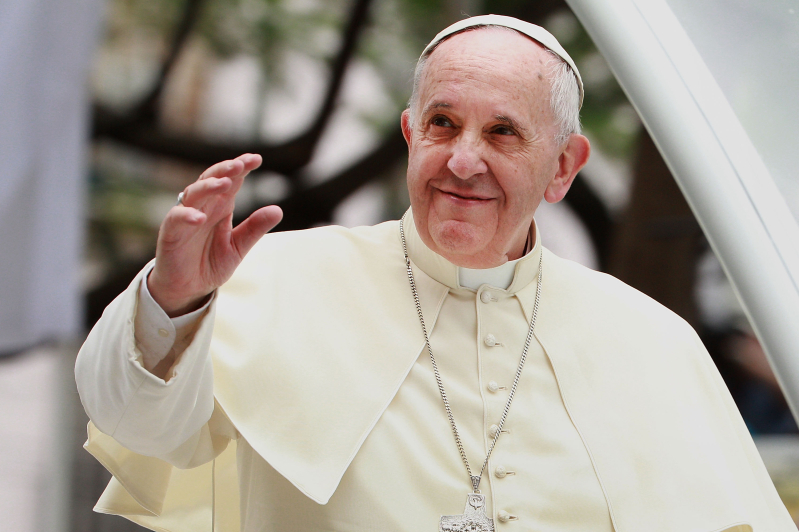
Pope Francis, the first Jesuit and Latin American pope, has died at the age of 88 following a period of worsening health, the Vatican confirmed Monday. The pontiff, who had been hospitalized in recent weeks for respiratory complications, leaves behind a complex and contested legacy that reshaped the modern papacy—while raising significant theological and political controversy.
Elected in 2013 following the resignation of Pope Benedict XVI, Francis—born Jorge Mario Bergoglio in Buenos Aires—immediately set himself apart with a populist, pastoral tone and gestures of humility. He took up residence in a Vatican guesthouse instead of the Apostolic Palace and styled himself as a reformer “from the ends of the earth,” calling for a “poor Church for the poor.”
But despite early hopes for renewal, Francis’ decade-long papacy often confounded expectations, provoking concern within Catholic ranks and mounting criticism from evangelical observers.
While many applauded his message of compassion and neighborly love, his pontificate at times blurred the lines between Catholic doctrine and political rhetoric. Statements such as “Who am I to judge?” on homosexuality and his consistent call to “be good people” over strict religious observance endeared him to secular audiences but unsettled theologians who feared a dilution of Christian distinctiveness.
In comments sent to Christian Daily International, Dr. Thomas Schirrmacher, former Secretary General of the World Evangelical Alliance and someone who maintained a close relationship with Francis—a relationship that drew criticism from some evangelicals—sought to offer a balanced yet critical assessment of the pope’s impact.
Schirrmacher commended Francis for confronting entrenched corruption in the Vatican and the Italian Mafia “even at the risk of his own life.” He also praised efforts to “de-nationalize” the Vatican, including ceding full security authority to Italian police and withdrawing from UN voting. These reforms, Schirrmacher said, marked a shift toward reducing the Vatican’s role as a political actor.
Interreligious relations also improved under Francis, particularly with Jews and Muslims. However, Schirrmacher warned that the pope’s interfaith emphasis often lapsed into relativism. “He more and more spoke of religions as different paths to God, like different languages,” he said.
Francis also improved Catholic-Evangelical cooperation in countries where Protestants have historically been marginalized. “In many countries, Catholics and Evangelicals now jointly advocate before governments,” Schirrmacher noted. He also acknowledged the pope’s global attention to Christian persecution, though lamented that “there was rarely institutional follow-up from the Vatican.”
Still, Schirrmacher was sharply critical of Francis’ political and theological trajectory. He noted the pope’s left-leaning activism—including outspoken climate advocacy, economic critiques such as “this economy kills,” and vocal support for mass migration—sometimes overshadowed his spiritual role. “Often, the Christian or Catholic perspective was barely discernible,” Schirrmacher said.
He pointed to Fratelli tutti, Francis’ 2020 encyclical on fraternity, as emblematic of the problem. “It was the most untheological encyclical ever written by a pope,” he said, noting its reliance on secular and Muslim authorities rather than biblical or Christian sources.
A particularly troubling move, in Schirrmacher’s view, was the pope’s secretive agreement with China, which effectively allows Beijing to select Catholic bishops. “Underground bishops remain imprisoned, and faithful Catholics face persecution—without Vatican protest,” he said, calling it a dramatic break from the Church’s historic defense of ecclesial autonomy.
Even in diplomatic matters where Francis initially showed promise—such as brokering U.S.-Cuba relations—Schirrmacher observed a sharp decline in effectiveness. The pope’s failed attempt to mediate the Russia-Ukraine war was especially stark. His reluctance to directly criticize Russia or Patriarch Kirill’s rhetoric, contrasted with vocal critiques of Israel, revealed a selective moral calculus.
On internal Church reform, Francis often fell short of expectations. Despite early signals of change, initiatives such as relaxing priestly celibacy during the Amazon Synod or introducing female deacons never materialized. “He raised hopes but the final documents ignored all major demands,” Schirrmacher said, quoting German theologian Michael Meier: “It seems to be an endless loop.”
Francis’ handling of LGBTQ+ issues reflected a similar pattern. “No doctrinal changes were made,” Schirrmacher noted, “but ambiguous remarks and inconsistent decisions—like allowing fleeting blessings for same-sex couples—upset both reformers and conservatives.”
Ultimately, Schirrmacher believes the challenge with the Pope's legacy is that “Francis’ political correctness often blurred the line between Christian witness and cultural accommodation.”
While some evangelicals welcomed his softer tone, emphasis on social justice, and concern for the marginalized, others remained critical of the underlying doctrinal framework.
Leonardo De Chirico, an Italian evangelical pastor and Vatican observer, argued that despite a more inclusive tone, Francis left intact a sacramental and hierarchical structure fundamentally at odds with biblical Christianity. “The gospel of grace alone, through faith alone, remains incompatible with the Catholic soteriology promoted by this pontificate,” De Chirico wrote.
As the Vatican prepares for what is expected to be one of the largest papal funerals in modern history, attention is already turning to the process of electing the next pope. The College of Cardinals will soon convene in a conclave to choose Francis’ successor—an event that could redefine the direction of the Catholic Church for decades to come.
Evangelicals observing from outside the fold will hope for a leader who upholds biblical teachings over ecclesial tradition or cultural relativism. While Francis’ supporters will remember him as a compassionate voice for the poor and marginalized, others—within both Catholic and evangelical circles—view his legacy as one of unfulfilled reform, theological ambiguity, and politicized leadership.





